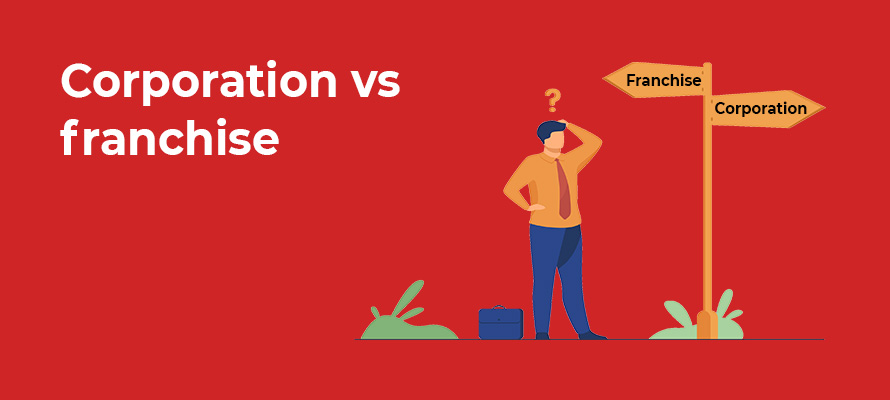As successful companies grow over time, there comes a time when they think about whether they want to expand their business by their means or need to branch out their business by offering outside investors to purchase franchises. When it comes to expanding a business that is ready for growth and primed, business owners start to contemplate various growth strategies. Two of the most common options that come to mind are corporation or franchising.
Both of these growth strategies are different from each other and comes with their kind of advantages and disadvantages. Whatever these, you are going to choose will have an impact on how you are going to run the business.
Corporation vs. Franchise
Corporate retail-owned businesses and franchises are different breeds. Companies usually plan to grow their successful concepts with any of these options. In any business, you might be able to get a clear distinction between both of these business models.
However, many of the individuals separate when it is about making a decision on which path is better to choose. It is because they are unaware of the facts such as market potential, pros, and cons, etc. about this.
To make things easier for you, here we have brought detailed information regarding corporation vs. franchise. So that you can get a better idea about everything in this regard:
Franchise
The franchise is a part of various similar business models which is used by businesses to grow. The franchising idea is a method used by the franchisor to grow and expand its business via the distribution of services and goods with a licensing relationship agreement. Franchising is a flexible model that can bring multiple benefits to the franchisors.
Under a franchise model, the franchisor collects fees in exchange for allowing franchisees to use its system and commercial symbols with liberty. It can be a massive departure from any non-franchised growth model.
Sometimes businesses don’t want to expand by opening more offices or hiring more staff at different locations due to added responsibilities, costs, and risks. For such businesses, franchising can be one of the best options to consider.
How does franchising work?
Franchising is a legal business model that design to accomplish multi-unit expansion in the best possible way. As compared to organic business expansion, where a business invests in multiple opening units itself, franchising allows a business to recruit others for business expansion.
In the franchising process, your franchisees will invest their time, capital, and managerial efforts to establish new locations by using your trademarks, brand, and system.
When you are opening a franchise, you are allowing your franchisees to use your brand name, trademark, products, logo, and more. Franchisees usually pay the franchisor to get the right to capitalize on an established entity. Various well-known brands are using this business model to grow their businesses across the regions. Some good examples are Subway, McDonald’s, UPS, and many more.
Franchises can work effectively for any business because they build in locations near people demanding their services and products. It helps the businesses to focus more on refining their business operations, ensuring that the needs of their customers appropriately meet as well as providing essential support to their franchisees from one location.
Key factors of franchise
Here we have shortlisted some of the significant advantages of franchises you must know:
Create new streams of revenue
When you are creating a franchise, you are just establishing a new business that lets you create multiple revenue streams from franchisors’ royalties and fees. When a franchisee comes on board, it will pay the initial cost to sign a franchise agreement as well as an ongoing percentage of their gross sales.
Easier multi-unit expansion
The essential benefit of franchising your business is that it will offer you a more natural expansion of multi-unit business without much time and capital consumption.
Less setup cost
In the franchising case, the franchisor usually has to pay far less amount than other business expansion methods. It is because the setup cost comes from franchisees. Surprisingly, not only this, franchisees keep paying continuously in terms of royalties for corporative promotion of their franchise. Ultimately, franchisors have to put far less investment in starting their franchise into new locations.
Fully committed staff
As a franchisor, you don’t have to hire in-office staff in case of franchising. Expansion of business with franchising can be more natural because franchisees hire their labor themselves usually.
Franchisees usually are more motivated and committed because they are responsible for the success of their company. They are usually fully committed to their franchise because they have put their own money as an investment.
Corporations
A corporation is an entity of business owned by shareholders or stakeholders. It usually has a board of directors to oversee the organization and its activities. An individual who owns a corporation will have complete control and power over all of its business and control. A corporation owner will have a free charge to change the services and products offered.
How does a corporation work?
Most corporations work with a board of directors responsible for handling different parts of an organization to ensure smoother operation of the business. A corporation also contains shareholders or stakeholders who will offer monetary input to the business organization. However, the liability is limited as you are the organization’s power.
While the corporation’s legal documentation process is usually lengthy and utterly different from franchises, it is mainly because a corporation is going to operate as a large organization.
Advantages of corporations
Here are key advantages of corporations which you need to know:
Limited liability
Corporations are high because this offers limited liability protection to all of their owners. Generally, owners of the corporation are not responsible for the liabilities and debts of the business. Ultimately, creditors will be unable to pursue the personal assets of owners.
Establishing credibility
Developing a corporation can support any small or startup business. It can help businesses to establish their credibility more effectively with potential employees, customers, partners, and vendors.
Raised capital
When it comes to the corporation, then, capital in this business model can be raised with ease via the sale of stock. Even more, many of the banks prefer to be the borrower of an incorporated business.
Unlimited life
The life of a corporation doesn’t depend on its owners. It possesses the feature of having an unlimited life. It means if an owner wished to sell his or her part of shares, the corporation would continue to do business.
Quick Comparison of Franchise and Corporation
Here we have a quick comparison of franchise and corporation to give you a better idea:
| Comparison Bases | Franchise | Corporation |
| Basic | Franchises are a part of the same business with multiple branches licensed to third-party persons. | While corporations are companies that used to come together to develop a firm setup which can be any profit or non-profit. |
| Ownership | Franchises are being owned by any third-party which is known as franchisee independently. | However, corporations are normally owned by the stakeholders who shared their profits and losses generated by business operations. |
| Control | Franchisees will have the right to control one franchise only. While franchisors will have strict control over business operations. Franchisors normally provide set methods to franchisees in terms of running their business effectively. It means general outlook, pricing, business model, and other things will be set by the franchisor. | While, for corporations, shareholders are represented by a board of directors and aren’t involved in any decision-making process directly. |
| Liability | While in the franchise the franchisor is liable for the actions of the employees of its franchise. | Within a corporation, stakeholders have limited liability. It means shares and assets will not directly be affected in case of any legal dispute. |
| Legal information | Franchising your business doe not need any lengthy legal process. It is because the franchise is a legal agreement between franchisees and franchisors based on permission to use the trademarks of the franchise among various other things. | When it comes to establishing a corporation then the process contains a lengthy legal process, that involves multiple documents that need to acquire before getting legal recognition. |
| Mode of operation | When it comes to operational requirements then franchisees usually have to pay ongoing costs in terms of liability to the franchisors. It is because they are going to use the name and fame of a successful and established brand. | While in the case of a corporation, the business normally works with the acquisition and distribution of stocks and shares. |
Franchise and corporation are two different business model which comes with their kind of strengths and weaknesses. However, when it comes to turning your business into a franchise or corporation, then you need to make a smart decision by keeping each aspect of both of these business models in your mind. Understand the differences between both terms and then consider the one you find more useful for you.













